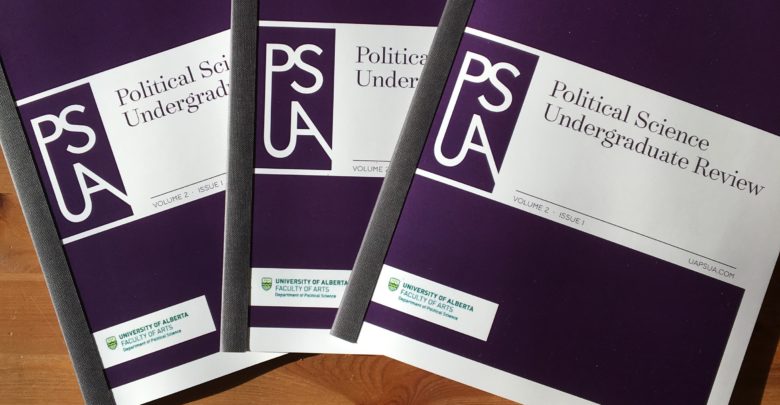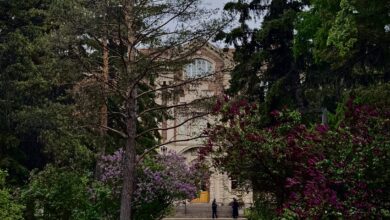Journal for political science students provides experience in academic writing and editing
 Supplied
SuppliedThere’s no better feeling than handing in an academic paper and get a mark back that you never expected to receive.
Now, have you ever thought of taking that paper and publishing it an undergraduate journal? The Political Science Undergraduate Review (PSUR) is one place where you can do that.
The PSUR, administered by the Political Science Undergraduate Association, is published yearly in April with 10 to 12 pieces that are written by students within their classes. Papers that receive a minimum A- in a University of Alberta political science class are eligible for publication. The deadline to submit pieces is January 25, 2021 for their next edition.
The Gateway interviewed three members of the PSUR, including fourth-year honours political science student Keysel Besa, political science major and philosophy minor student Aldous Cabarron, and third-year honours in political science and minor in psychology student Kael Kropp.
Besa acts as the PSUR editor-in-chief while Cabarron and Kropp are a reviewer and senior section editor, respectively.
This year’s issue of the PSUR coincides with the 40-year anniversary of the Canadian Charter of Rights and Freedom. For the very first time, the PSUR will be accepting submissions to publish a special edition in order to commemorate this occasion.
Interview responses have been edited for clarity and brevity.
The Gateway: Can you please explain the PSUR? Who is involved in putting it together?
Besa: The PSUR is put together by undergraduate political science students who signed up to be members of the editorial board. Their key responsibilities include reviewing and copyediting the papers we receive. However, some of them are also responsible for special portfolios such as marketing, publishing, and cover design. Our journal is known for its robust peer-review process and academic scrutiny. Normally, we receive roughly 50-60 submissions each year but we only publish roughly 10 of those.
Kropp: The PSUR is a non-partisan, peer-reviewed academic journal showcasing the best research and essays of undergraduate students in the political science department. This year, Keysel Besa is our Editor-in-Chief, responsible for overseeing our ‘International Relations’ and ‘Comparative Politics’ sections of the journal. I am thrilled to be returning this year as Senior Editor of our ‘Canadian Politics’ and ‘Gender & Politics’ sections. However, we have quite an extensive team consisting of copy editors and submissions reviewers.
Our process is double-blind to ensure the anonymity of our reviewers and authors — diminishing any perception of bias while bolstering the integrity of the publication. The entire team is responsible for ensuring the integrity of our peer-review process and the overall quality of our journal.
Walk me through the submission process step by step. What can students expect when they submit a piece?
Kropp: When students submit to the PSUR, they can expect a collaborative, constructive relationship with submission reviewers and editors.
First, students create an account with Open Journal Systems and begin the ‘Making a Submission’ process on our website. There is a handy check-list highlighting all of the requirements that must be met in order to proceed with the submissions process.
Once the article meets all of the requirements, the student can submit a Microsoft Word file and enter all relevant metadata (i.e., author name, article title, abstract). Our review process is ‘double-blind,’ meaning submissions reviewers do not know the identity of the author, and the author does not know the identity of their specific submissions reviewers. Two submissions reviewers look over each article to ensure the highest quality recommendations can be offered in later collaboration with the author.
Once a decision has been reached by the senior editor of each section, concerning the inclusion of an article, the collaborative, constructive process begins. The PSUR is proud to work with student authors to improve their submissions. Our suggestions are then incorporated by the authors to create a solid second draft. Once a paper is deemed ready for publication, our copy editors ensure all grammar and spelling, reference styles, and citations are error free. Finally, the submission is published in the PSUR! It sounds like an arduous process, however, we strive to make it as headache-free as possible — I promise!
Cabarron: As a reviewer, my task involves reviewing the merits of the paper and ensuring it meets the criteria of the journal. I examine both the paper’s strongest and weakest points while offering some of my assessments on where the author can improve the quality of their writing. This includes proper citation, correct spelling, coherent direction of the paper among other considerations. Moreover, I make some suggestions on how the author can improve their arguments as well as highlighting their compelling points. After reviewing a paper, I make a recommendation whether to accept or decline the submitted paper, and in most cases, some revisions are required to further improve the paper’s quality.
What have your experiences with the PSUR been like? Any positive memories or specific encounters?
Besa: I think the best part about reviewing papers is getting a chance to see the thought process of other students. It never fails to fascinate me whenever I am reading a paper with a key thesis I agree on but uses evidence that I never thought about. Because of this, I often learn something new as I review papers submitted to us.
Kropp: This is my second-year with the PSUR. I have made so many lasting friendships through the peer-review process (shoutout to Abby Kohler) and have immensely enjoyed reading the excellent research by fellow students in the political science department. The highlight of my day is coming across a piece of student writing that dances off the page. In my time at the PSUR, I have had the pleasure to read some excellent writing from a diverse pool of students. It is always a wonderful thing to learn from your peers.
What have you learned through your involvement in the PSUR?
Besa: The key takeaway I have is the importance of writing for our education. My involvement with the PSUR made me think deep and hard about why we are asked to write and write a lot throughout our university career. For me, I have learned that learning to write is equivalent to learning to think critically because writing is a form of formalized thinking: it is through writing that I attempt to discover the strengths and weaknesses of my ideas. Meanwhile, it is through a writer’s involvement in a peer-review process where they potentially see the blindspots of their argument and how it could be improved.
Kropp: The biggest lesson I have learned in my experience with the PSUR is that editing is by far one of the most important tools you have in your arsenal. Editing plays such an intrinsic role in the way we produce content and, on a larger scale, interact in our daily lives. Editing ensures that the highest possible quality, in whatever medium you operate in, is delivered. A good idea, sentence, or piece of insight in a first draft can be transformed into a phenomenal one by applying some interrogation and evaluation into its construction. When I edit, I focus on refining my first draft to be concise, well-evidenced, and potent. I have gleaned those skills in my time at the PSUR and strive to put them to proper use when editing other students’ work.
Cabarron: One lesson I have learned is that every author has unique writing techniques and diverse approaches to writing. The PSUR also allowed me to immerse myself in the peer-review process and its importance in ensuring that we as reviewers have a job to examine papers in an open, unbiased, and impartial manner. Most importantly, my duty as a reviewer also influenced my understanding of diverse and distinct subjects in political science and has certainly provided me with the tools to become a better writer.
Why is the PSUR an important part of the U of A campus?
Besa: The PSUR is one manifestation of our collective attempt to bolster and cultivate civil discourse about important issues. The PSUR’s guiding vision and principle is our commitment to free speech and academic freedom. We strive to remain impartial, non-partisan, and neutral as we review papers we receive by ensuring that we judge the papers we receive not by the type of argument it advances or its ideological proclivity but by the way it was argued by the author.
Kropp: The PSUR is a hugely important part of the U of A campus. Our well-established journal gives undergraduate students the experience of publishing a peer-reviewed journal that can assist in their future academic or professional pursuits. The PSUR fosters a community of diverse thinkers to submit and edit the highest quality essays possible for publication. The PSUR has always strived to give voice to fellow students in their research and academic interests.
Cabarron: The PSUR is an integral part of enabling students to become editors of journals they are passionate about, it inspires them to make a difference during their time at the University of Alberta and most especially, the PSUR allows students to contribute significant work in the field of Political Science.
What benefits do students get from being published in a journal like the PSUR?
Besa: The vast majority of undergraduate students do not get professional work experience while in school which could be disadvantageous for them when they are competing against more experienced candidates for grad school or even for employment. Because of this, getting involved in academics such as the PSUR makes for a good starting point in bolstering one’s academic qualifications.
Kropp: Having published, peer-reviewed work can be an asset when applying to grad school or future professional opportunities. It shows you are familiar with the peer-review process and that your work is of a certain quality. Moreover, the process introduces you to new people with possibly different perspectives. This can be a rewarding experience, as it allows you to integrate alternate ways of thinking in your future writing. Submitting with the PSUR promises to be a respectful and constructive process–one that you will not regret.



